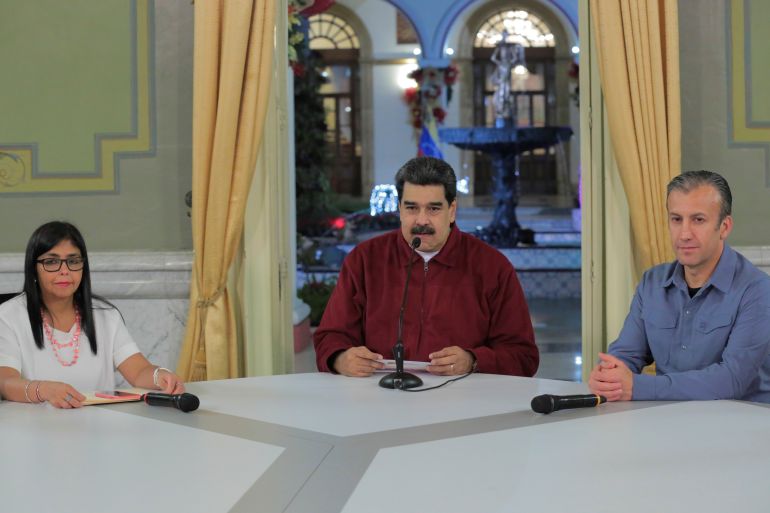Venezuela’s powerful oil tsar resigns amid corruption inquiry
Petroleum Minister Tareck El Aissami announces his resignation on Twitter, saying he will cooperate with gov’t investigation.

Venezuela’s powerful petroleum minister has announced his resignation following the detention of at least six high-level officials amid a corruption inquiry focused on state-run company Petroleos de Venezuela SA (PDVSA), the judiciary, and other parts of the government.
Tareck El Aissami announced his resignation on Twitter on Monday and pledged to help the investigation of any allegations involving PDVSA, while also offering support to President Nicolás Maduro’s anti-corruption campaign.
Keep reading
list of 4 itemsUS removes relative of Venezuela’s Maduro from sanctions list
US judge denies diplomatic immunity for Maduro ally Alex Saab
Is West’s opposition to rule by Venezuela’s Maduro fragmenting?
“… I place myself at the disposal of the leadership [of the ruling party] to support this crusade that the President @NicolasMaduro has undertaken against the anti-values that we are obliged to fight, even with our lives,” El Aissami wrote.
De igual manera, en mi condición de militante revolucionario, me coloco a disposición de la dirección del PSUV para apoyar esta cruzada que ha emprendido el Presidente @NicolasMaduro contra los antivalores que estamos obligados a combatir, hasta con nuestras vidas.
— Tareck El Aissami (@TareckPSUV) March 20, 2023
Maduro did not immediately name a replacement for El Aissami, who has served as vice president, and as a minister and mayor over the past two decades.
Maduro, who has led previous corruption drives, said in televised remarks that his government is committed to “going to the root” of the problem.
Though corruption has long been rampant in Venezuela, arresting government officials for corrupt practices is rare in a country with the world’s largest petroleum reserves. That officials are rarely held accountable is a major irritant to citizens, the majority of whom now live on $1.90 a day, the international benchmark of extreme poverty.
Maduro acknowledged El Aissami’s resignation in televised remarks during a gathering of governing party leaders. He said he accepted the minister’s decision “to facilitate all the investigations that should result in the establishment of the truth, the punishment of the culprits, and justice in all these cases”.
The US government designated El Aissami, a powerful Maduro ally, a narcotics kingpin in 2017 in connection with activities in his previous positions as the country’s interior minister and governor. The US Treasury Department alleges “he oversaw or partially owned narcotics shipments of over 1,000 kilograms from Venezuela on multiple occasions, including those with the final destinations of Mexico and the United States”. He has denied the allegations.
Under the government of the late President Hugo Chávez, El Aissami headed the Ministry of Internal Affairs. He was appointed minister of oil in April 2020.
Oil is Venezuela’s most important industry.
A windfall of hundreds of billions in oil dollars thanks to record-high global prices allowed Chávez to launch numerous initiatives, including state-run food markets, new public housing, free health clinics and education programmes.
But a subsequent drop in prices and government mismanagement, first under Chávez’s government and then Maduro’s, ended the lavish spending. And so began a complex crisis that has pushed millions into poverty and driven more than seven million Venezuelans to migrate.
PDVSA’s mismanagement, and more recently economic sanctions imposed by the US, have also led to a steady production decline, going from 3.5 million barrels per day when Chávez took power in 1999 to roughly 700,000 barrels per day last year.
In 2016, Venezuela’s then opposition-led National Assembly said $11bn had gone missing at PDVSA in the 2004-14 period. In 2015, the US Treasury Department accused a bank in Andorra of laundering some $2 bn stolen from PDVSA.